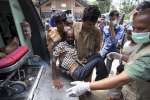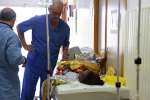- Text size
 |
|  |
|  |
| 
- عربي
Survivors tell harrowing tales of fight for air on "boat of death" off Libya
News Stories, 28 August 2015
PALERMO, Italy, Aug 28 (UNHCR) – Abdel pushed his face up to the cracks between the wooden floorboards, gasping for air.
Next to him between 200 and 300 migrants and refugees – who departed Zuwarah, Libya in the early hours of Tuesday morning on a rickety wooden boat – were suffocating in the pitch-black hold.
"We didn't want to go down there but they beat us with sticks to force us," said Abdel, 25, from Sudan. "We had no air so we were trying to get back up through the hatch and to breathe through the cracks in the ceiling. But the other passengers were scared the boat would capsize so they pushed us back down and beat us too.
"Some were stamping on our hands."
A total of 52 people, including Bangladeshis, Pakistanis and Sudanese, died on board the boat. One man from Sudan was stabbed to death as he tried to climb out of the hold to ask for water. The others died of asphyxiation.
The bodies, along with the survivors of the tragedy, were brought to shore in the port of Palermo on Thursday night. Poseidon, a Swedish coast guard vessel, docked in the Sicilian capital around 8.15 pm, carrying 572 refugees and migrants plucked from boats in the Mediterranean the previous day. Some 100 people were found on a rubber dinghy, which came from Tripoli, and another 460 on the wooden boat.
Some refugees paid thousands of euros/dollars for tickets on the upper deck of the two-tier wooden ship. Many expected to travel in relative comfort but were shocked by the condition of the boat.
"I wanted to turn back when I saw the ship," said 45-year-old Hsna who boarded the boat with her husband, three daughters and baby son.
"It was just a fishing boat and we took our lives in our hands. It was a boat of death."
Passengers were transported in rubber dinghies in groups of 20 from the shore to the shipping vessel. Once they boarded the dinghies, they were not allowed to turn back.
Amina, 18, from Damascus, said she feared for her safety travelling as a young woman without her husband. "It was very dangerous because I'm so young," she said. "And we also had no food and no water."
Amina, who left Libya with her father-in-law, sister-in-law and her sister-in-law's two-month-old baby girl, described the three days at sea as "very difficult".
Mahdi, an orthopaedic surgeon from Iraq paid 3,000 euros to get his wife Hend and two-year-old son Mahmed on the top deck.
The family said they were forced to flee Iraq after Mahdi refused to treat militants.
"I had to get my family out," Mahdi said. "I saw what they were doing to everyone else who didn't obey them."
The migrants and refugees will now be taken to reception centres across mainland Italy. 16 Syrians, including three families, will stay in Palermo.
At least 15 people have been taken into custody on suspicion of trafficking.
By Alice Philipson, Sicily, Italy







































